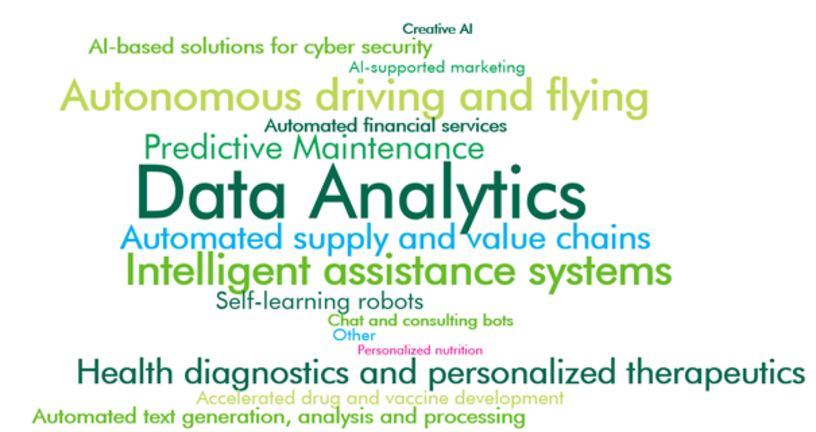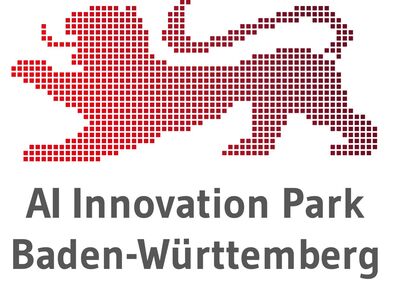Early 2020, the Ministry of Economic Affairs, Labour and Housing of the state of Baden-Württemberg has contracted the global real estate service provider CBRE to conduct a feasibility study for an Innovation Park Artificial Intelligence (IPAI) in Baden-Württemberg. The study aims to examine the realization of such an Innovation Park with support of the state of Baden-Württemberg. During the course of the study a high level of interest from various stakeholders inside and outside the state towards this idea was revealed. It also became apparent that appropriate locations are available for the realization of such a park. Moreover, the feasibility study has shown that comprehensive positive economic effects can be expected from an AI Innovation Park. In order to report on the findings of the feasibility study available so far and, above all, to inform about the further procedure for the realization of the Innovation Park AI, a virtual conference was held on 27th November 2020.
The host Dr. Nicole Hoffmeister-Kraut, Minister of Economic Affairs, Labour and Housing of the state of Baden-Württemberg, opened the conference and gave the audience a warm welcome. In her opening speech she focused on the importance of AI regarding the structural challenges in Baden-Württemberg. AI is a key factor within the transformation process of integral economic industries such as the automotive sector or the machinery construction sector. She stated that the federal state has to be prepared to break new ground and heavily invest in AI and other emerging technologies in order to be able to play in the first international league. The Innovation Park AI is the largest innovation project which Baden-Württemberg has undertaken in decades. With the help of a feasibility study, the state initially wanted to have the realization of such an Innovation Park AI examined.
Results of the feasibility study to date
The results of the feasibility study to date were then presented by Volker Schmidt, Manager Digital Advisory at CBRE. The empirical data collection was conducted in the form of qualitative interviews. Therefore, 60 interviews with 79 different interview partners and in total more than 80 hours material on first impressions, thoughts and ideas for the Innovation Park AI were conducted. Based on these interviews, a public online survey was carried out to additionally collect quantitative data. Additionally, CBRE also spoke to Innovation Park experts on a global level like e.g. H-Farm in Italy, Switzerland Innovation or the HighTech Campus in Eindhoven.
One of the main results of the conducted online-survey shows that more than 70% of the participants prefer a big location for the Innovation Park, whether it is one big location, several big locations or one big location with several cooperation centres. Furthermore, the AI-relevant industries from a stakeholder perspective are considered to be information and communication technology (53,6%), automotive (43,9%), production technology (38,2%), health (33%), medicine (30,7%) and logistics (27%). Additionally it was asked what kind of products and services generated in the park could have the highest market potential. The answers range from data analytics (13,7%), intelligent assistance systems (10,8%), autonomous driving and flying (10,7%) or automatized value chains (10%). The listed answers can help to draw conclusions on the formation of an attractive ecosystem, what kind of talent and companies have to be attracted as well as what kind of value chains could be represented within the park. As a result of the accelerated results report of the feasibility study, CBRE strongly confirms its feasibility.

To give the conference attendees an insight on how AI can be used and what the concepts for an Innovation Park AI could focus on, Dr. Susanne Hügel, Head of Digital Innovation & Business Acceleration Continental Europe at CBRE, presented some examples of AI. Starting with algorithms in everyday life and applications like facial recognition on the smartphone, Dr. Hügel then talked about a possible focal point for Baden-Württemberg: autonomous driving (and flying). Another example poses the field of predictive maintenance, which is a key factor in industry 4.0, logistics and data analytics. Besides the economic relevance, the human component poses another application e.g. in health diagnostics, medical technology and personalized therapeutics. AI has opened up numerous potentials to address current political and social issues. Dr. Hügel ended her speech by motivating the applicants with the famous quote: "The best way to predict the future is to shape it". With this in mind, the applicants were invited to let themselves inspire by these examples and to develop ideas and concepts for the planned competition procedures for the realization of the Innovation Park AI.
How the funding competition works
Subsequently, Dr. Ute Jasper, partner at the law office HEUKING KÜHN LÜER WOJTEK, presented the conditions of the planned competition process for the site selection of the Innovation Park AI. Ms. Dr. Jasper touched upon three main areas:
- Why will the funding for the Innovation Park AI be allocated through a competition? The Ministry of Economic Affairs, Labour and Housing has decided to decide upon the funding after executing a Europe-wide, competitive procedure for site selection which is transparent, non-discriminatory and free to join for anybody interested. The winner of the competition will be granted the right to put forward an application for the funding of the Innovation Park AI.
- What will be the evaluation criteria for the competition? The detailed requirements are described in the competition documents.
- How does the process of the competition work? In a first stage, a rough concept has to be prepared by the participants. The detailed requirements are described in the competition documents. The submission deadline for the first phase was January 29th, 2021. Subsequently it will be examined which participants meet the set minimum requirements and therefore remain in the competition with the right to submit preliminary overcall concepts by 22nd February 2021. In the further course, the competition participants will have the opportunity to present their overall concepts. The final overall concepts must then be submitted by 10th March 2021. The overall concepts will then be reviewed, with the help of an international, high-ranking jury that evaluates the concepts and makes a recommendation for the site selection. The decision on the site selection will be made by the state government, presumably in spring 2021.
Questions and Answers
The second part of the conference was an open question and answer session for all conference participants answered by the previous speakers Mr. Schmidt, Ms. Dr. Jasper and Mr. Günther Leßnerkraus, Head of Department 3 – Industry, Innovation, Applied Research and Digitalisation of the Ministry of Economic Affairs, Labour and Housing of the State of Baden-Württemberg. Most of the questions concerned the competitive procedure and the general idea of the Innovation Park AI.
All questions asked during the conference can be found in the questionnaires published under the following link: https://www.wirtschaft-digital-bw.de/ki-made-in-bw/innovationspark-kuenstliche-intelligenz-baden-wuerttemberg/wettbewerbsverfahren
More information
You can find a recording of the conference here (with the possibility of displaying subtitles in different lagnuages).
Information concerning the Innovation Park AI Baden-Württemberg as well as more information on the feasibility study and the competitive process was started on 3rd December 2020 can be found here.
Contact person
Verena Schneider
Ministerium für Wirtschaft, Arbeit und Tourismus Baden-WürttembergReferentin Digitalisierung der Wirtschaft
Willi-Bleicher-Straße 19
70174 Stuttgart
 verena.schneider@wm.bwl.de
verena.schneider@wm.bwl.de +49 711 123 2203
+49 711 123 2203

